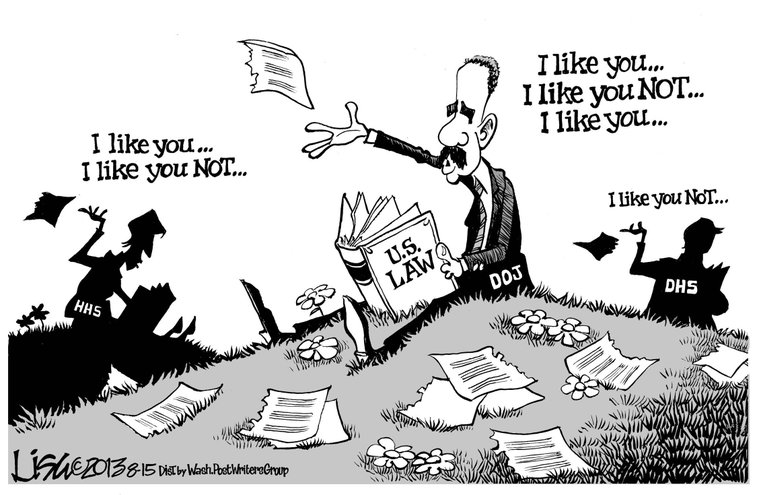
The Obama administration on Monday announced that it was delaying, once again, enforcement of the Affordable Care Act (ACA) “employer mandate.” Yes, Republicans have done everything they can to impede implementation of this law. Yes, their “solution” — gutting the individual mandate — is an awful idea. And, yes, their public response to the administration’s action was predictably over-the-top. But none of that excuses President Obama’s increasingly cavalier approach to picking and choosing how to enforce this law. Imagine how Democrats would respond if a President Rand Paul, say, moved into the White House in 2017 and announced he was going to put off provisions of Obamacare he thought might be too onerous to administer.
The Treasury Department released rules Monday for medium and large employers, which under the ACA are supposed to chip in for their employees’ health care. The law says they were supposed to have provided health coverage to full-time employees by Jan. 1 or pay fines to help defray the government’s costs of covering them. Last summer, in response to business concerns that the rules weren’t ready, Treasury delayed these requirements for a year.
That was already a stretch of governmental discretion, but it was defensible given the law’s complexity and the relatively small consequences of delaying this particular mandate. This week, Treasury changed the rules again: medium-size businesses will get another year before they must comply, and large businesses will have a softer coverage target to meet next year. This delays any bad press or bad feelings engendered by the mandate beyond the 2014 election.
The administration claims legal wiggle room in the Internal Revenue Code, which allows the Treasury secretary to make “needful rules and regulations” about tax collection, including those “as may be necessary by reason of any alteration of law.” Treasury has used this provision to justify smoothing out the phase-in of other laws. But the administration is unilaterally making distinctions between large businesses and medium ones; the latter group, which will get hit hardest and scream loudest when the employer mandate kicks in, will be treated more leniently. The law is also explicit that the government should be enforcing penalties already; that’s the plainest interpretation of Congress’s intent. The administration shouldn’t dismiss that without exceptionally good reason. Fear of a midterm shellacking doesn’t qualify as good reason.
Studies have shown that the employer mandate isn’t key to insuring more people, so its implementation is not crucial to getting the whole ACA working. Rather, it’s mostly a revenue-raising measure to fund health-care reform; the first year-long delay cost the Treasury $12 billion. If there’s a less disruptive way to raise that money, Congress should repeal the employer mandate. Until then, the president should implement the law.
. . . . . . . . . . . . . . . . . . . . .
This article was written by the editorial board of The Washington Post.
